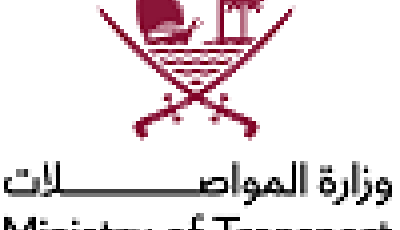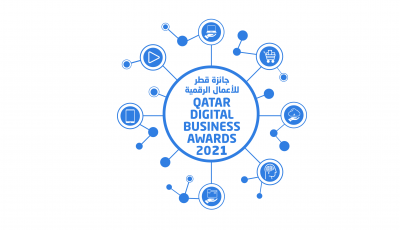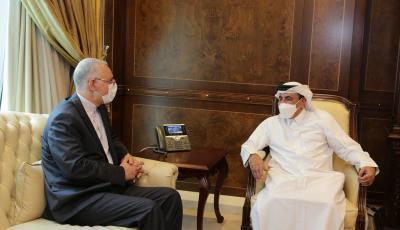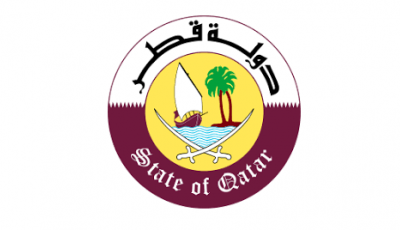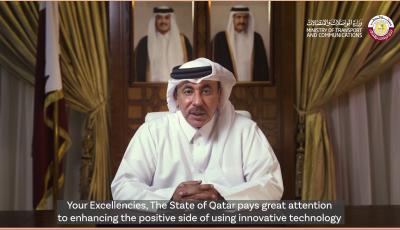TASMU Takes Major Strides in Turning Smart Qatar Vision into Reality
Doha – QatarThe Smart Qatar Program (TASMU), one of the key initiatives led by the Ministry of Transport and Communications, has announced its 2020 achievements that were accomplished in cooperation with partners in the public and private sectors. These achievements will help transform Qatar into a smart country and support key sectors in responding and adapting to economic challenges.With the people at the heart of its strategy, TASMU identified 12 personas that come from all walks of life, from retired individuals, to new moms and blue-collars workers. Studying and understanding their backgrounds, needs, digital skill levels and pain points, TASMU is developing smart solutions and applications that will benefit and empower the people.Her Excellency Mrs. Reem Mohammed Al Mansoori, Assistant Undersecretary of Digital Society Development, at MOTC, said: “TASMU strives to build a smart Qatar that is sustainable and capable of providing a better quality of life for our society. Investing in human capabilities and advanced technology, we are developing smart solutions and applications that will transform our lives for the better by making services more effective and accessible. Our efforts will help build an economy that supports innovation and drives investment. TASMU smart solutions and applications will provide precise analytics and comprehensive insights that will support the country’s decision makers.”She added: “With strength in mission, unity in purpose and agility in problem solving, the TASMU program successfully delivered upon its mandate in 2020. We are proud of the progress the program has achieved by fostering innovation through collaboration and coordination with all stakeholders that will fuel the country’s digital transformation. We still have a lot of work ahead of us, as we need to intensify and focus our efforts in order to support Qatar’s economic competitiveness and contribute to digital position and role as an innovation hub in the region.” The TASMU program has 23 initiatives operating under four main pillars that will ensure all sectors have the capability to achieve the goals of Qatar’s digital transformation.Implementing a program of this magnitude, which has a profound impact on the entire country, requires robust governance that can set the foundations and lead its effective rollout. In the past year, TASMU’s governance model was established to define systems, tools, processes, methods; and leadership required to manage the TASMU program and the several initiatives it boasts. The governance committees and groups that have been formed will ensure successful implementation and management of the nationwide digital transformation.Simultaneously, TASMU has developed a five-year roadmap for policies and standards that will serve as the regulatory framework underpinning the smart country initiatives. From protecting the confidentiality, integrity, and availability of information, to reducing ethical risks and negative social and environmental impacts of adopting emerging technologies, TASMU developed six common policies: Security Policy, Data Policy, Interoperability Policy, Electronic Commerce & Transaction Policy, Experience Policy and Societal Impact Policy. These ensure the ICT ecosystem in Qatar has the necessary guidelines to develop meaningful, safe, and relevant experiences to the users of TASMU smart solutions and applications.To enable and drive the development of all of these smart solutions and applications, TASMU is building a one-of-a-kind smart city solution, which connects all sectors and smart solutions. The TASMU Central Platform will have a website and a Mobile Application. Developers will be using the platform and its services to build smart solutions. With the initial launch planned for 2021, TASMU Central Platform will eventually be the nerve center for smart solutions development and the orchestration of these services across the five priority sectors.2020 also saw accelerated development of a variety of platform capabilities including advanced reporting and analytics, identity and profile management, notification services, cybersecurity, and payment gateway, among others.Sheikh Nasser bin Hamad bin Nasser Al Thani, Chief Commercial Officer at Ooredoo, the lead partner of the consortium that has been awarded the TASMU Central Platform development contract at QITCOM 2019 said: “We are proud that Ooredoo is supporting this smart city project for the Ministry of Transport and Communications and the State of Qatar, working with esteemed organizations including malomatia, Microsoft, Delta Partners, PWC, Accenture, Atos and other consortium members. These members include the best global corporations and the brightest local talents, offering the ideal combination to launch a platform that can compete internationally”.He added, “The TASMU Central Platform will be a key enabler for the Smart Qatar Program and the State of Qatar in our drive towards achieving the Qatar National Vision 2030, and we are honored to be a pivotal part of this mission. The Platform will also accelerate the growth of the smart city ecosystem and facilitate launch-to-market for use case providers to enhance citizens’ lives. We are also excited to announce that we are taking part in an Acceleration Program, as part of the Smart Qatar Central Platform initiative, aimed at helping start-ups in Qatar and beyond, enabling them to become part of this smart city program and contribute to the growth of Qatar’s digital economy and ecosystem”.Remarkable achievements were also accomplished in terms of smart solution implementation. In the healthcare sector, working closely with the Ministry of Public Health (MOPH) and other stakeholders, TASMU accelerated the implementation of Virtual Consultation service, which ensured that the local community is empowered to curb the COVID-19 pandemic, and can access medical advice, diagnosis and prescriptions from the comfort and safety of their homes. The first virtual consultation clinic was launched on March 26, 2020 and 188 clinics were made available to date across MOPH, Primary Health Care Corporation, Hamad Medical Corporation and Sidra Medicine.. Since then, more than 720,000 voice and video consultations have been conducted with patients from over 100 different nationalities in collaboration with healthcare providers, out of which more than 56,000 were done through TASMU Virtual Consultation solution.Commenting on the achievements of TASMU in the healthcare sector, Dr. Juliet Ibrahim, eHealth Director at Ministry of Public Health (MOPH), said: “TASMU is a highly valued program for the health sector in Qatar, as it will provide smart services that aim to improve the timeliness and convenience of healthcare services, as well as support improved health outcomes through innovative digital services and applications.”In the Environment sector, TASMU’s Digital Farmer Community solution has been successfully piloted in collaboration with the Agricultural Affairs department of the Ministry of Municipality and Environment (MME). Being developed exclusively for the farming community, the solution provides localized agriculture information and crop-specific advice. Leveraging IoT and satellite technology, the solution establishes a national repository of knowledge for all farms in Qatar, helping increase farms’ productivity while reducing the usage of fertilizers and pesticides.In 2020, seven farms participated in the pilot phase which tested some of the platform features ahead of the full launch planned to take place in 2021 that will grant all farms in Qatar with full access to the smart solution. The sophisticated solution integrated real-time weather data from the Qatar Meteorology Department and high-resolution satellite images from the Center for Geographic Information System to assist farms with professional advice on production planning, crop best practices, pest and disease management.Year 2020 also saw the successful completion of phase one of the National Food Security Analytics solution, in collaboration with the Food Security Department of the MME, which acts as a centralized database integrating insightful information from various stakeholders and provides recommendations to government officials and business owners to help safeguard national food security by unlocking the power of AI-driven decision making. Empowering import diversification and promoting local production, the pilot solution will see the addition of more features in 2021 when its fully launched.Supporting stakeholders from five priority sectors, TASMU is refreshing the smart sector strategies of each sector outlining their key performance indicators (KPIs) to ensure they will produce tangible results in correspondence with the needs of the people of Qatar. The strategies also determine the project governance, implementation plan, data governance and functional blueprint that will guide the sector in the implementation of the sector platform, detailing how data should be managed and accessed, and how the platform technology could be leveraged to optimize the sector’s efforts in implementing smart solutions and applications.In 2020, TASMU finalized the detailed strategies of three of the five priority sectors: TASMU Healthcare, TASMU Environment and TASMU Sports. By holding workshops with stakeholders, the refreshed strategies outlined 21 healthcare, 23 sports and 25 environment priority smart solutions that stem from the real-life pain points and challenges of different population segments based on sectors’ priorities and KPIs. These smart solutions will leverage advanced and innovative technologies such as Artificial Intelligence, Augmented Reality, Internet of Things, Blockchain and Big Data Analytics. The smart solutions will also benefit from TASMU’s policies and standards to ensure that they are safe and relevant to TASMU users.There are many more smart solutions and applications in the TASMU pipeline ranging from a parking solution in the Transportation sector, which will help find available parking spaces, navigate to, reserve, and pay for them; to a crowd and transportation management solution, which will capture crowd and traffic trends and derive insights for long term management and planning decisions, as well as short-term responses to deliver an optimal travel experience, especially during the FIFA World Cup Qatar 2022™. All of these solutions will ultimately be powered by and connected through the TASMU Central Platform, offering better experiences for citizens, residents and visitors of Qatar.Eng. Fahad Ebrahim Juma Al Muhana, Director of Strategy and Projects Management Office at Qatar Olympic Committee, said: “Digital transformation, sustainability and knowledge management are the foundations of the Qatar Olympic Committee's strategy, where digital transformation contributes to enhanced performance and increased organizational effectiveness, as well as the development and progress of human and technological capabilities, to keep up with the pace of evolution and acceleration in the technical world. Working and collaborating with the Smart Qatar (TASMU) Program contributes to these strategic pillars of the Committee. It also increases cooperation between the Qatar Olympic Committee and other institutions that support and contribute to the Sports sector and the Olympic movement. The projects and performance indicators that have been worked on within the system of governance and management of integrated projects are a qualitative shift in the framework of institutional work between several entities. They also help meet future challenges, build on achievements, and connect relevant resources with the goals of the Committee.”On behalf of Kahramaa, Director of the Customer Services Department, Yousef Al Jaidah, stated: "Qatar General Electricity and Water Corporation (Kahramaa) is keen to cooperate with all sectors in the country to achieve the objectives of the Kahramaa Strategy that is in parallel with the goals of Qatar National Vision 2030. The collaboration between the foundation and the Smart Qatar Program (TASMU) was an opportunity to benefit from technology, innovation, and digital initiatives to achieve the foundation's goals and projects. This collaboration between Kahramaa and TASMU resulted in the signing of partnerships for the completion of a number of strategic projects in the fields of environment and sustainability and contribute to the rationalization of individual energy and water consumption."To support Qatar’s digital ecosystem and accelerate the implementation of smart solutions and applications, TASMU oversees the TASMU Digital Valley (TDV), which acts as the acknowledged ecosystem orchestrator driving the priority sectors’ growth through various strategic initiatives and powering the supply of TASMU smart solutions and applications. In 2020, TDV’s partnerships with Qatar Free Zone Authority, Qatar Financial Centre, Digital Incubation Center and TASMU Innovation Lab were activated for the delivery of services across areas such as market access, matchmaking, incubation, entrepreneurship, and networking. In collaboration with these partners, TDV supports the innovation journey of its members, which consist of local and international start-ups, SMEs and multinational companies in the technology sector.Tasked to raise Qatar’s profile as a competitive innovation hub, in collaboration with key partners, TDV conducted foreign direct investment outreach webinars in 2020, reaching out to more than 600 attendees across seven countries including Turkey, Japan, Taiwan, Singapore, Russia, UK and US. The local collaborations and international outreach activities resulted in welcoming 80 new members to the TDV ecosystem.Complementing Qatar’s vibrant ICT ecosystem, TASMU Innovation Lab was inaugurated in February 2020 to help create an enabling environment that supports innovators and entrepreneurs with inventing products and services that address national priorities. The Lab brings a lean model and practical approach to help priority sectors innovate around their key challenges, from ideation to the development of minimum viable products, to venture making, and the creation of prototypes that pro-actively build towards eventual deployments and concept commercialization.At the TASMU Innovation Lab, researchers and entrepreneurs can take their ideas from applied research to early commercialization and get the opportunity to deploy their projects at multiple Pilot Zones that include: Lusail Smart City, Msheireb Downtown Doha, Aspire Zone, Qatar Foundation and UDC’s The Pearl-Qatar. These pilot zones offer a unique ecosystem for smart technology innovation and provides Qatar with the ability to develop and formulate operational requirements, test legislative and legal boundaries, and evaluate business models in live environments.TASMU Innovation Lab successfully conducted innovation workshops and provided mentorship and advisory support throughout 2020. Currently, the Lab has more than thirty innovative solutions in the pipeline that leverage cloud computing, mobile robotics and drone technology. Five of these solutions are near final stages and the rest under stakeholder evaluation.Recognizing the fact that behind the machines, algorithms, and technologies there is human creativity and ingenuity, TASMU is also working on equipping the people of Qatar with advanced digital skills. Throughout the year, TASMU worked with local and international experts, reviewed global best practices and identified digital development priorities that Qatar's workforce needs to adopt over the next 10 years. This was followed with a detailed strategy consisting of 14 impactful projects to develop the digital skills for Qatar's workforce and youth. Consolidating this comprehensive study into a ten-year Digital Skills Roadmap, TASMU is working to launch programs focused on establishing Digital Skills for the Youth, Digital Skills for the Workforce, as well as Digital Skills Awareness Campaigns in 2021.In the upcoming five years, TASMU will also enact policies that ensure all digital services are intuitive and easily accessible by different population segments and organize nationwide events annually to promote digital inclusion in Qatar. This will be supported by e-learning modules that teach different population segments the basic digital skills required to increase their usage of useful digital smart solutions and applications available to them. To that effect, TASMU developed a refreshed National Digital Inclusion Strategy, which aims to enhance digital access, increase digital skills level within the community, increase the community’s motivation to use digital services, and increase level of trust in online transactions across the population. The strategy is in line with the most impactful global best practices and informed by a comprehensive local research study. In addition to being enabled by policies and frameworks, TASMU is reaching out to organizations with complementary capabilities to successfully drive the implementation of the Digital Inclusion strategy.TASMU is committed to building a smart, sustainable, and vibrant society through the use of advanced technology and innovation. It is working with government entities, entrepreneurs, multinational companies, research, and academic institutes to create tangible smart solutions and applications that are relevant to Qatar's challenges, target priority sectors, and will improve the quality of life for Qatar’s citizens, residents, and visitors.Through the TASMU Program, Qatar has made large investments in the tech industry and has identified more than 60 investment opportunities, available in the next four years, across various sectors. Investors, entrepreneurs, and technology companies are encouraged to be a part of the Smart Qatar journey.
